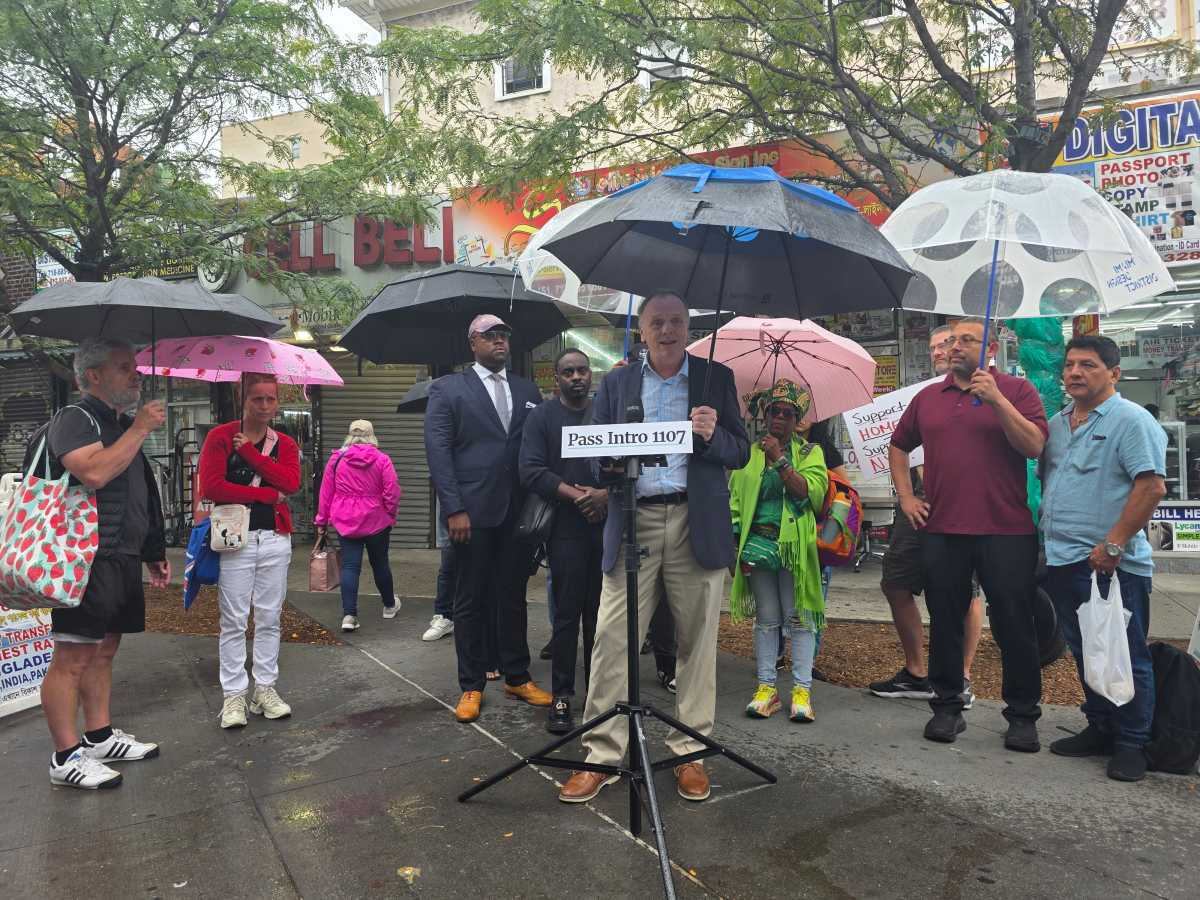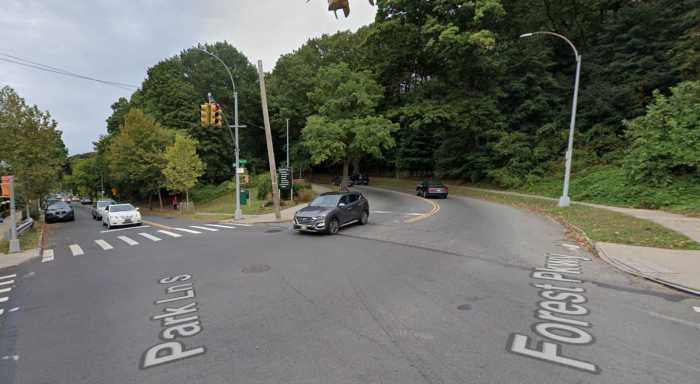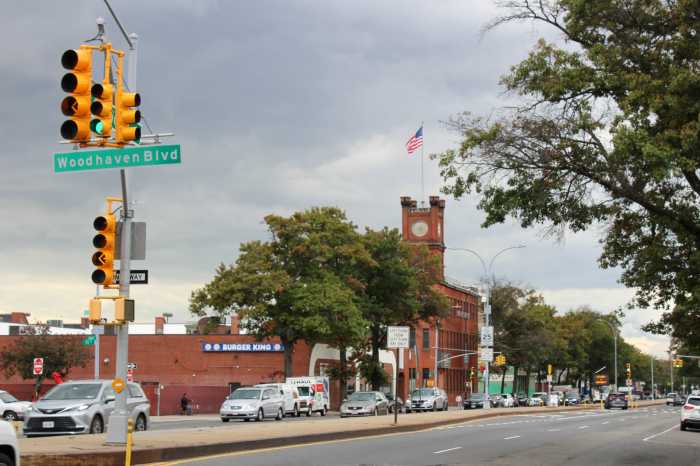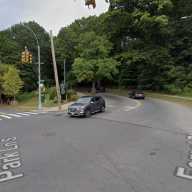Community organizations and Queens homeowners gathered at Diversity Plaza in Jackson Heights Wednesday morning to rally in support of City Council legislation aiming to expand flexibility for short-term rentals, such as Airbnb, in New York City.
Intro 1107, introduced by Brooklyn Council Member Farah Louis, proposes amendments to the city’s short-term rental policies by allowing the owners of one or two-family homes to rent out their space to up to four adults plus children. The proposed legislation would also eliminate an existing law that requires homeowners to be present while letting out their homes.
Current laws enforced by the city mandate that homes can only be made available on sites such as Airbnb if the host is present during a person’s stay. That law, introduced in January 2022 and known as Local Law 18, also mandates that short-term rentals can only be leased to a maximum of two adults at a time.
The regulations were first introduced by former Council Member Ben Kallos as Int. 2309 and sought to address the city’s housing crisis by limiting short-term rentals and making more homes available for long-term rent.
However, homeowners and community groups, including the NAACP, Queens Chamber of Commerce and Haitian Americans United for Progress, gathered in Jackson Heights on Aug. 20 to rally in support of Louis’s legislation, which would relax some of the existing laws surrounding short-term rentals.
Protesters said Wednesday that the existing city laws deprive homeowners of an opportunity to cope with rising costs by letting out their home on a short-term basis.
Miguel Bernard, a homeowner in Richmond Hill who had used Airbnb to rent out his home whenever he left town with his family, said the site helped him to “offset” the cost of traveling and living in the city.
“New York is expensive,” Bernard said. “Living here is not easy… the extra income really helped my family pay the mortgage.”
Bernard, who rented a two-bedroom apartment to guests visiting the city before Local Law 18 came into effect, said existing laws also prevent lesser-explored areas of the city from benefitting from tourism.
“Families came here, they would save money and they were grateful,” Bernard said.
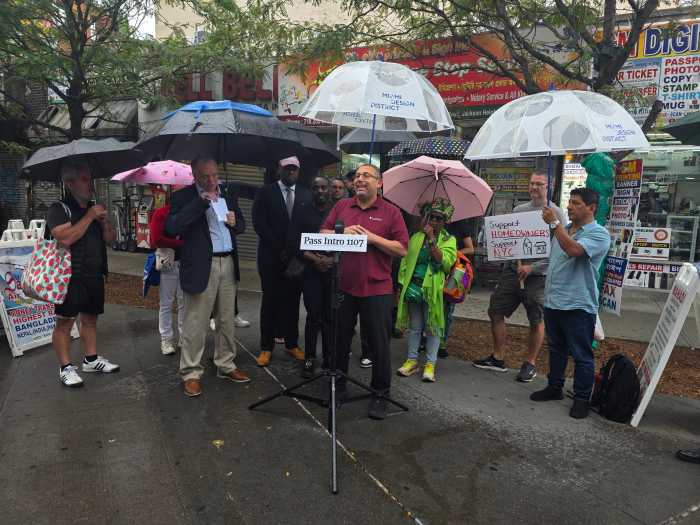
Organizers of Wednesday’s rally said they chose to hold the event in Jackson Heights because the neighborhood does not boast many hotels and has suffered from a fall in tourism since Local Law 18 came into effect.
Jason Harrington, an Astoria homeowner who let out his home on Airbnb prior to the existing legislation, said short-term rentals helped bring people to neighborhoods that they would have never visited otherwise.
“Astoria is a great neighborhood that’s close to the city,” Harrington said. “Guests could also walk to bars and restaurants, which helps our local businesses.”
Jermaine Sean Smith, executive director of the Southern Queens Park Association, said short-term rentals would provide homeowners with an opportunity to offset some of the costs of living in New York City.
Smith described Intro 1107 as a “real opportunity for change” and said it is currently “ridiculous” that homeowners cannot let out their homes on a short-term basis.
Brendan Levy, a representative of the Queens Chamber of Commerce, said short-term rentals such as Airbnb bring “vital tourism dollars” to neighborhoods that might otherwise be overlooked.
“Short-term rentals bring tourists to the outer boroughs, where visitors are more likely to stay and meet family-owned businesses,” Levy said.
He added that short-term rentals allow tourists to experience the outer boroughs and life in the “real New York.”
Jean Lewis-Baptiste, an Airbnb “super host” who had been renting out her Mill Basin home for eight years prior to the law change, said the restrictions on short-term rentals have impacted her “financially, physically and emotionally.”
Many supporters of Intro 1107 said recent law changes have not helped address New York City’s affordability crisis, arguing that hotel prices have exponentially increased since the changes were introduced.
Some opponents to Intro 1107, however, argue that the proposed legislation does not have strong enough enforcement mechanisms to protect one and two-family homes from speculative investments from private equity firms seeking to profit from short-term rentals.
Earlier this year, grassroots coalition Tenants not Tourists rallied against the legislation at City Hall, arguing that the bill would allow landlords to withdraw significant portions of their rental units from the market.
Darius Gordon, executive director of the Met Council on Housing, said at the Jan. 23 rally that the legislation would “pull the rug out from under tenants.”
New York City Comptroller Brad Lander also outlined his opposition to the legislation at the time, stating that the bill will do nothing to address New York’s housing crisis.
“Rolling back the strongest Airbnb protections in the country will not solve the affordable housing crisis that is pushing New Yorkers out of the city,” Lander said.
Several Council Members, including Manhattan Council Member Harvey Epstein, attended the January rally and warned that the legislation would “place real estate interests ahead of the needs of tenants.”
“The city is already struggling with record-low vacancy rates, and this bill would make it even more challenging for tenants to find affordable places to live,” Epstein said at the time.
Smith, on the other hand, said the legislation must be supported by “consistent feedback” and regulations from the city that protect homeowners against speculative buyers.

